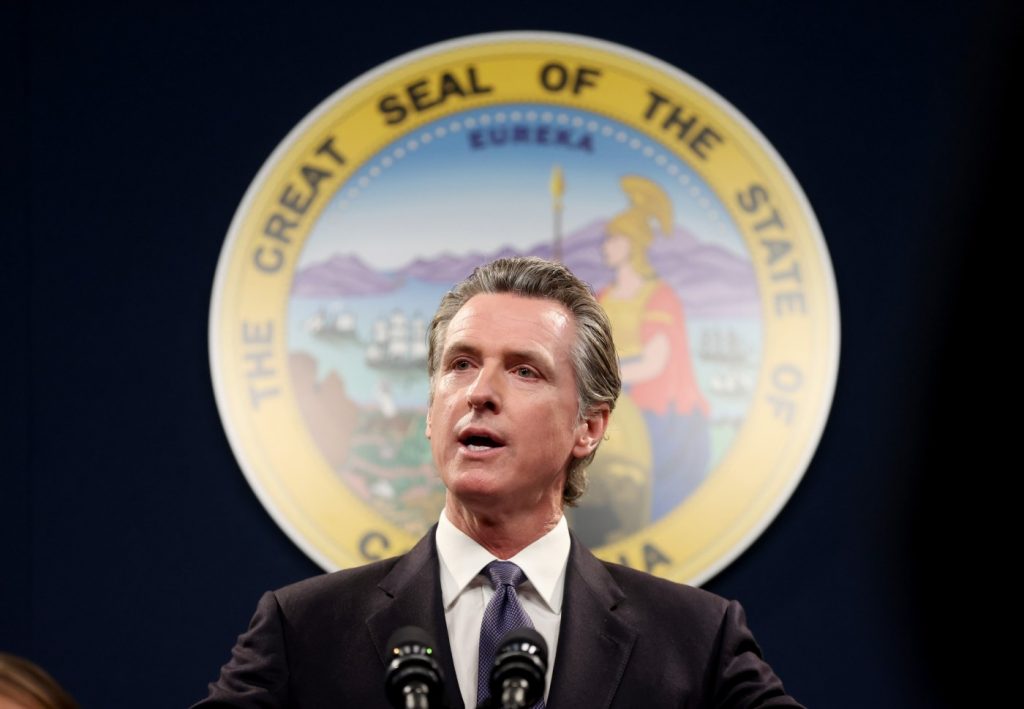Gov. Gavin Newsom’s political future could be determined by how he responds to Assembly Republicans’ call for a special legislative session to address California’s staggering budget shortfall.
Newsom owns this mess. At the start of last year, he was bragging about the state’s $98 billion budget surplus. Last week, Legislative Analyst Gabriel Petek warned that the state now faces a $68 billion deficit.
All Newsom’s galivanting around the country trying to burnish his national reputation, touting California for its progressive policies, serving as a campaign surrogate for President Joe Biden and debate-bashing Florida Gov. Ron DeSantis for his state’s right-wing policies will be for naught if he fails to get a grip on the fiscal crisis at home.
All anyone will remember about Newsom is the soaring state spending under his reign that led to massive red ink. If he has any doubts about that, he should just ask Gray Davis, the recalled governor who presided over the state’s budget crisis when the dot-com bubble burst.
Newsom says that this time is different, that the state is better positioned to weather the current downturn. To a certain extent, that’s true. But those advantages will slip away if Newsom fails to act with alacrity.
The Assembly Republicans are right. Newsom cannot afford to wait through the upcoming half-year of haggling over the 2024-25 budget, which takes effect July 1. The budget problem stems in significant part from shortfalls for the last and the current fiscal years that need to be addressed now. As in any household that finds itself going into debt, the longer it takes to balance revenue with spending, the bigger the shortfall that will have to be made up later.
What’s disturbing is the governor’s apparent lack of urgency. He claims that the shortfall is no surprise and that he has it all under control. “We’ve known this. We’ve known this since we’ve had these crazy surpluses,” he told the Sacramento Bee. “We’ve prepared for this.”
The numbers tell a different story. If Newsom knew this shortfall was coming, why did he allow it to balloon to such enormous proportions? Since Newsom took office in 2019, state spending per California resident has increased a whopping 56%. Spending as a portion of personal income — a measure that adjusts for economic growth — has soared 31%.
As Newsom and the Democratic-controlled Legislature were rapidly ramping up spending, they were failing to adjust for the economic uncertainties of the state’s slowing economy, triggered in large part by the rising interest rates.
The problem was compounded by the Internal Revenue Service’s ridiculous decision to delay the income tax filing deadline for most Californians this year from April 15 to Oct. 16 and then to Nov. 16 because of last winter’s storm-disaster declarations. It left state economic forecasters without critical income tax revenue data.
It would have made sense for the IRS to offer tax-filing delays for just those who suffered damage. But the IRS’s ridiculous policy does not distinguish within disaster counties between people and businesses that endured harm and the rest of us. The decision by the federal taxing agency backed California’s Franchise Tax Board, which collects state income taxes, into a corner, with no choice but to follow suit.
We warned at the time that this could lead to serious state budgetary problems. We’re sad to say we were right. Just as we feared, state lawmakers, flying blind on income tax revenue numbers, failed to plan conservatively.
Related Articles
Editorial: After Interstate 10 inferno, California should stop leasing freeway land
Editorial: California Legislature must act to support local news
Editorial: Here’s how to break the Oakland A’s grip on the Coliseum
Editorial: Tainted probe of Baby Phoenix fentanyl death should be halted
Nearly a half year after the 2022-23 fiscal year ended, we now learn that revenue fell $26 billion below estimates. Revenues for the current 2023-24 fiscal year probably won’t be much better. Which goes a long way toward explaining the three-year $68 billion shortfall.
The state’s budget deficits don’t end there. Beyond the 2024-25 fiscal year, without corrective action, California faces annual operating deficits of around $30 billion a year for at least the following three years.
In short, California state government is living beyond its means. Newsom has a marvelous gift of gab. But he’s going to have a difficult time talking his way out of this crisis. Especially if he and his fellow Democrats who control the Legislature don’t swiftly address it.


